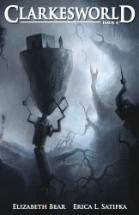"Automatic"
by Erica L. Satifka"Orm the Beautiful" by Elizabeth Bear
Issue 4 of Clarkesworld Magazine provides two earthbound tales—one of a fantastical near future and one of an alien-dominated, postapocalyptic dystopia.
For the dragon lovers, Elizabeth Bear‘s "Orm the Beautiful" is a charming tale of the last dragon on Earth. Orm has lived for countless ages inside the mother-cave, charged with the duty of warden to his kin’s past. His family lays dead around him, and yet in death they sing, each voice a part of the magnificent Chord that is the history of his species. When men discover his cave, he fights their dragon-like yellow machines and kills the ones who dare enter, but he knows they will return like ants, in numbers too huge to stop. To preserve his wards, he flies to Washington and speaks with Katherine Samson, the curator of the Museum of Natural History. Together, they devise a scheme to immortalize the lineage of dragons.
Bear’s prose is simple and yet complex, a blending of narrative and dialogue with layers of meaning. Though current trends flow towards dark and miserable endings, "Orm the Beautiful" ends happily, but it is a bittersweet confection. The preservation of family, and with it, heritage, is a skill we humans tend to lack, or even renounce. Yet we have museums and storytellers who continue in their tireless efforts to safeguard artifacts, despite opposition from the greedy and shortsighted. I would hope that our world would be as open to Orm’s proposal as the one that Bear has penned. May we all do our part to protect that which is too easily lost. As I stare out at the green grass of my yard, which should at this time of year be covered in snow, I wonder whether I’ve done enough to save that which is most precious to us all—the world itself.
Refreshingly bleak, "Automatic" by Erica L. Satifka scurries through a future where humans have it bad. The unnamed narrator "rents his optic nerve to vacationers from Ganymede for forty skins a night," and so propels the reader into a New York City with only three hundred and twenty residents. The Ganys can take over a body or rent it in whole or part. Due to a plague, the human population is so fragile, so microscopically small, that most people concern themselves only with procreation. The city is separated from the country by "an invisible olfactory wall, to keep humans and germs from mingling." The narrator meets a woman, and though we expect good sex, we get something different, a theme of the story itself.
In less than sixteen hundred words, Satifka creates the near-impossible: a believable, dark future where hope has been nearly extinguished and yet the hero still has the balls to make an effort. The story’s beauty is in the details—from free foodslabs, to flaking walls, to the dry recounting of the plague’s history. With cyber-style and witty dialogue "Automatic" is an alluring candyman taunt where the drinks are laced with cynicism, the people are shadows of what they could have been, and the ending arrives too soon.
